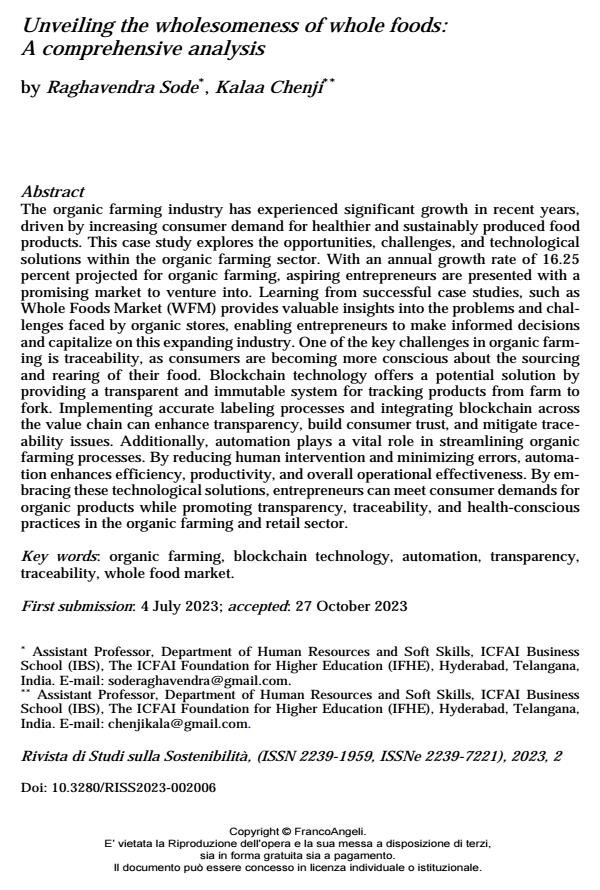Unveiling the wholesomeness of whole foods: A comprehensive analysis
Journal title RIVISTA DI STUDI SULLA SOSTENIBILITA'
Author/s Raghavendra Sode, Kalaa Chenji
Publishing Year 2024 Issue 2023/2
Language English Pages 17 P. 89-105 File size 64 KB
DOI 10.3280/RISS2023-002006
DOI is like a bar code for intellectual property: to have more infomation
click here
Below, you can see the article first page
If you want to buy this article in PDF format, you can do it, following the instructions to buy download credits

FrancoAngeli is member of Publishers International Linking Association, Inc (PILA), a not-for-profit association which run the CrossRef service enabling links to and from online scholarly content.
The organic farming industry has experienced significant growth in recent years, driven by increasing consumer demand for healthier and sustainably produced food products. This case study explores the opportunities, challenges, and technological solutions within the organic farming sector. With an annual growth rate of 16.25 percent projected for organic farming, aspiring entrepreneurs are presented with a promising market to venture into. Learning from successful case studies, such as Whole Foods Market (WFM) provides valuable insights into the problems and challenges faced by organic stores, enabling entrepreneurs to make informed decisions and capitalize on this expanding industry. One of the key challenges in organic farming is traceability, as consumers are becoming more conscious about the sourcing and rearing of their food. Blockchain technology offers a potential solution by providing a transparent and immutable system for tracking products from farm to fork. Implementing accurate labeling processes and integrating blockchain across the value chain can enhance transparency, build consumer trust, and mitigate traceability issues. Additionally, automation plays a vital role in streamlining organic farming processes. By reducing human intervention and minimizing errors, automation enhances efficiency, productivity, and overall operational effectiveness. By embracing these technological solutions, entrepreneurs can meet consumer demands for organic products while promoting transparency, traceability, and health-conscious practices in the organic farming and retail sector.
Keywords: organic farming, blockchain technology, automation, transparency, traceability, whole food market.
Raghavendra Sode, Kalaa Chenji, Unveiling the wholesomeness of whole foods: A comprehensive analysis in "RIVISTA DI STUDI SULLA SOSTENIBILITA'" 2/2023, pp 89-105, DOI: 10.3280/RISS2023-002006